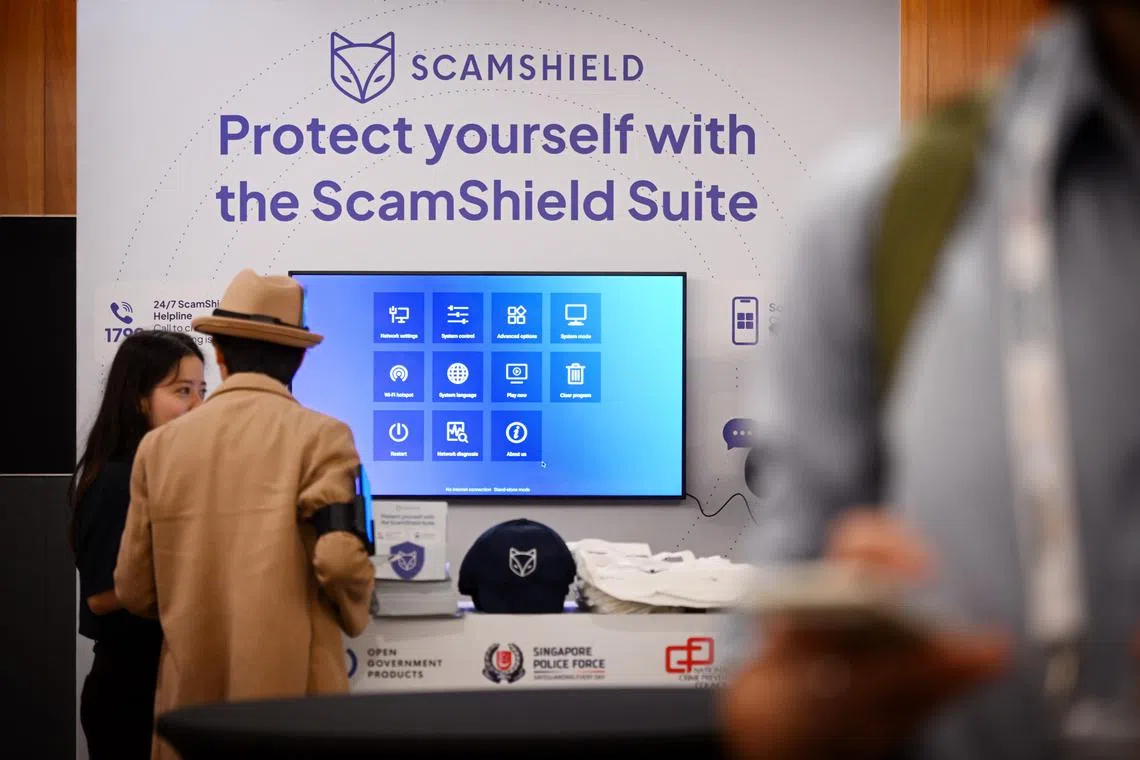S’pore’s GovTech is first govt agency worldwide to join global scam intelligence network
Sign up now: Get ST's newsletters delivered to your inbox

Besides GovTech, other partners include tech corporations Microsoft and Meta.
ST PHOTO: KUA CHEE SIONG
- GovTech Singapore joins the Global Signal Exchange, a network sharing scam intelligence to combat scams globally.
- Scams cost an estimated US$1.03 trillion globally; Singapore sees high scam rates and losses in South-east Asia.
- Despite a drop in overall losses, large-loss scams are rising in Singapore, though recovery rates are higher compared to other regions.
AI generated
SINGAPORE – To allow the authorities to take faster action against scammers, Singapore’s Government Technology Agency (GovTech) has become the first government agency in the world to join a global network for exchanging scam-related intelligence.
By joining the Global Signal Exchange (GSE), GovTech will receive information regarding, among other things, the latest scam tactics and websites from around the globe.
Senior Minister of State for Digital Development and Information Tan Kiat How announced this at the Global Anti-Scam Summit Asia 2025 on Sept 2.
For example, when a web address used by scammers is flagged by the GSE, the authorities can block or take it down swiftly.
Mr Tan said: “Being part of this network allows us to have early information about what’s happening in other jurisdictions. And, most importantly, when something happens, we know how to engage them.”
The GSE was launched in January by British-based cyber intelligence and consultancy firm Oxford Information Labs, tech giant Google and non-profit organisation Global Anti-Scam Alliance (Gasa).
Its goal is to slash online fraud by half within the next decade by sharing information about cybercrime between law enforcement agencies and organisations like cyber-security firms and data providers.
The GSE has tracked more than 425 million scam signals worldwide since its inception, including e-mail addresses, URLs and phone numbers used by scammers.
More than 230 organisations have joined, or are in the process of joining the network. Besides GovTech, other partners include tech corporations Microsoft and Meta.
A GovTech spokesman said it will share both confirmed and likely scam sites with the GSE in collaboration with the Singapore Police Force.
It will also explore other types of signals for future sharing.
GSE chief executive and co-founder Emily Taylor said that previously there was no international and cross-sector information-sharing networks about scams, and this was a missing link in combating them.
“Isn’t it more efficient to pool the information that you know, and be able to not just inoculate yourselves from harm, but also expand the collective knowledge (on scams)?”
Ms Taylor said the network is also in talks with other governments about joining the GSE.
She said: “Only law enforcement can actually start to complete that criminal justice arc that the fight against scam and fraud needs... It is something that the private sector cannot do alone.”
The summit, held at the Suntec Singapore Convention and Exhibition Centre, is organised by Gasa and ends on Sept 3.
Over 700 industry leaders, policymakers and enforcement agencies from over 60 countries have gathered to discuss how to combat scams.
At a fireside chat, Mr Tan likened its attendees to the Justice League – a DC Comics superhero team.
Noting the growth in attendance from 2024’s conference, he said: “I’m glad that the Justice League – the network of good people, the defenders, the scam busters – is growing.”
Mr Tan, who is also patron of the Gasa Singapore Chapter, called scams a global issue of grave concern, and said they were being accelerated by technology.

Senior Minister of State for Digital Development and Information Tan Kiat How said that with GovTech SG joining GSE, the authorities can take action earlier against scammers.
ST PHOTO: KUA CHEE SIONG
Gasa’s latest Global State of Scams Report 2024 found that an estimated US$1.03 trillion (S$1.32 trillion) was lost to scams worldwide from September 2023 to September 2024.
Mr Tan called for the network of anti-scam partners to enlarge and include more governments, community partners and tech companies.
He said: “The most important power that we have is the power of partnership and collaboration, and it’s something that can’t be easily replicated by the bad actors.”
Scams in South-east Asia
Gasa’s latest State of Scams in South-east Asia report, which surveyed 1,000 adults from each of six countries in the region, found that 66 per cent of adults in Singapore had encountered scams in the last 12 months.
This was higher than the average of 63 per cent across adults from the other South-east Asian countries, including Thailand, Indonesia and the Philippines.
Singapore also recorded the highest average amount lost per person to scams at $2,132, more than thrice the average amount of $660 lost per person on average in the region.

But the report noted that recovery of scam losses was more common in Singapore, with 43 per cent of scam victims here recovering at least some of their money, higher than the average in the region of 22 per cent.
Investment and impersonation scams were the top scam types in South-east Asia, and also some of the most common scams in Singapore.
Scam victims here lost close to half a billion dollars
The $456.4 million lost between January and June was a 12.6 per cent drop from the $522.4 million lost during the same period in 2024.



